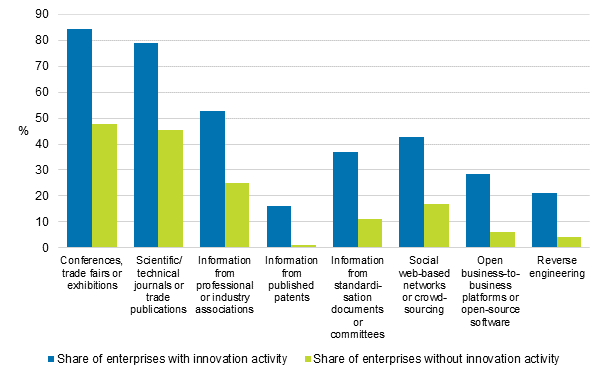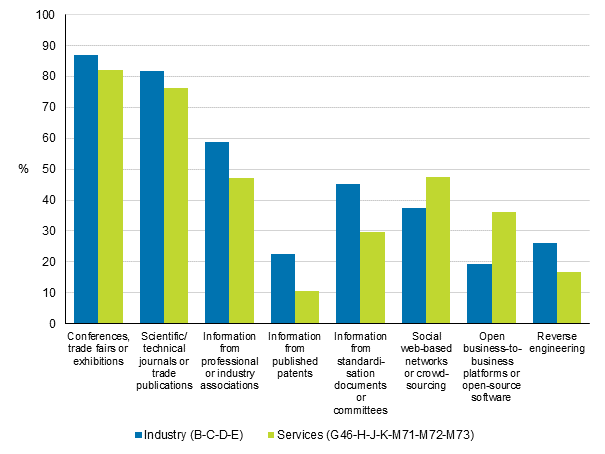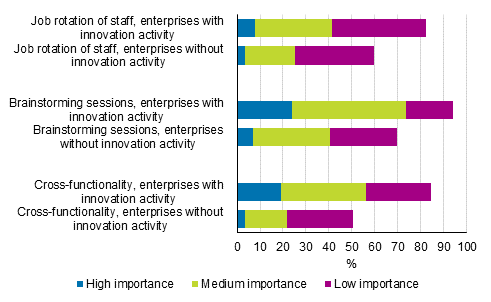14. Channels to acquire knowledge and knowledge transfer and sharing in the enterprise
Of the channels to acquire knowledge inquired in the Innovation Survey the most common ones for enterprises were conferences, trade fairs and exhibitions. Of enterprises with innovation activity, 84 per cent received information in this way, 48 per cent of other enterprises. The next most common channels to acquire knowledge were scientific and technical journals or commercial publications and professional and industry associations. Information included in patents appeared a worthwhile source of information only for those with innovation activity. Enterprises with no innovation activity did not widely use possibilities provided by open environments or information derived from reverse engineering. Otherwise knowledge was sought fairly actively from events, journals and publications, for example.
Figure 20. Prevalence of the use of channels to acquire knowledge in 2016 to 2018

Information included in published patents, standardisation documents or committees or reverse engineering were due to their technical emphasis more common sources of knowledge for manufacturing operators than for service industries. In contrast, enterprises in service industries reported more often than manufacturing enterprises social networks and crowdsourcing and open platforms and systems as channels to acquire knowledge.
Figure 21. Prevalence of the use of channels to acquire knowledge in total industry and services in 2016 to 2018, share of enterprises with innovation activity

Planned job rotation of staff across different functional areas is at least a relatively important method of organising work for 41 per cent of enterprises with innovation activity, and for every fourth of other enterprises in the survey. Cross-functional work groups or teams are regarded even more often than this as important methods of organising work in enterprises with innovation activity.
The most important of the methods of organising work inquired were brainstorming sessions, which were considered of at least medium importance by over 70 per cent of innovating enterprises and 40 per cent of other enterprises.
Figure 22. Prevalence and importance of methods of organising work in 2016 to 2018

The importance of different methods of organising work were assessed fairly similarly in manufacturing and services. Brainstorming sessions were assessed as being of at least medium importance by 77 per cent of enterprises with innovation activity in service industries and by 70 per cent of manufacturing enterprises. For job rotation the results were 39 and 44 per cent, respectively, and for cross-functional work groups 58 and 53 per cent.
Job rotation of staff was nearly as common in different size categories, especially in manufacturing enterprises. Brainstorming sessions were considerably general in all size categories, but clearly more general in the largest enterprises in manufacturing than in smaller enterprises. In application of cross-functionality there was a clear difference between smaller and bigger manufacturing enterprises, because nearly nine out of ten big enterprises organise their activity with cross-functional work groups and teams. In service industries cross-functional work groups were applied more evenly in all size categories.
Further information by industry and size category
Protection and IPR measures and acquisition of knowledge and technology in enterprises by industry group and enterprise size categoryProtection and IPR measures and acquisition of knowledge and technology in enterprises by industry
Source: Innovation 2018, Statistics Finland
Inquiries: Mervi Niemi 029 551 3263, Heidi Pirkola 029 551 3246, tiede.teknologia@stat.fi
Director in charge: Mari Yl�-Jarkko
Updated 23.4.2020
Official Statistics of Finland (OSF):
Innovation [e-publication].
ISSN=1797-4399. 2018,
14. Channels to acquire knowledge and knowledge transfer and sharing in the enterprise
. Helsinki: Statistics Finland [referred: 20.2.2026].
Access method: http://stat.fi/til/inn/2018/inn_2018_2020-04-23_kat_016_en.html

